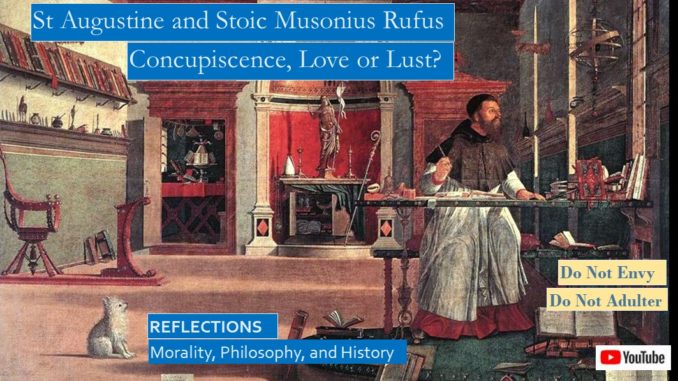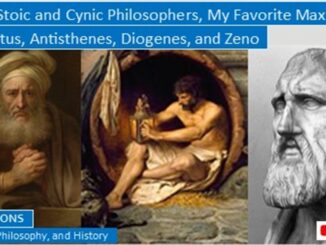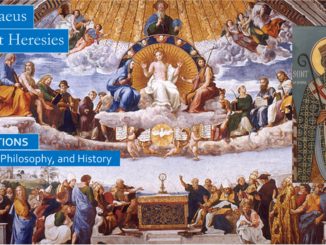
St Augustine starts his discussion on “On the Good of Marriage” with a discussion how marriage is first a friendship in bonds of family, and a friendship between man and wife, friends who walk together, side by side, raising children, growing old together.[1]
St Augustine is a bit harsher in “Marriage and Concupiscence,” teaching that “in matrimony, let these nuptial blessings be the objects of our love – offspring, fidelity, the sacramental bond.” This sacramental bond is meant to be ever-enduring, “lost neither by divorce nor by adultery, and should be guarded by husband and wife with concord and charity.” St Augustine ends this paragraph with a conclusion many modern readers would hesitate concluding, and I doubt were St Augustine to be alive today he would put it this way, but even so, we should be open to the message, for it has application to modern men also:
“Carnal concupiscence must not be ascribed to marriage; it is only to be tolerated in marriage. It is not a good which comes out of the essence of marriage, but an evil which is the accident of original sin.”[2]
St Augustine on Concupiscence, Blog 1 http://www.seekingvirtueandwisdom.com/st-augustine-on-concupiscence-blog-1/
See related blog: Musonius Rufus on Concupiscence and Controlling the Appetites
http://www.seekingvirtueandwisdom.com/musonius-rufus-on-concupiscence-and-controlling-the-appetites/
The best electronic version of Nicene and Post-Nicene Fathers, Series 1, Volumes 3 and 5, containing these works, is at: https://www.christianbook.com
YouTube video, St Augustine, Stoic Musonius Rufus, & Ruth on Concupiscence: Love or Lust? Controlling the Passions
https://youtu.be/-wv6bVeG74A
How can we imagine St Augustine would rephrase this were he to be alive today? Perhaps he would assert that although physical intimacy is a glue that holds marriages together, and provides the children which bring joy into our lives, this physical intimacy should be far down the list, behind friendship, behind parenthood, behind emotional intimacy, behind our Love for God, which should come first, and through which all our other loves become stronger, but if physical intimacy is the only glue holding our marriage together, all we would have is one big sticky mess, a mucky tar baby.
Possibly St Augustine would point out that the concept that physical intimacy is always damnable before marriage but always blessed and blissful after marriage is a very shallow view of the virtue of marriage. Nobody among neither the ancients nor the moderns can deny the value of both spouses announcing their fidelity to one another in marriage. St Augustine admits that concupiscence should be tolerated in marriage, a debt that should be honored. His message for us today is whether before or after marriage, the doubt raised by physical intimacy is whether we are using the other for our physical pleasure, and we can never be sure whether we are or not. Since we are less in danger of putting our spouse at risk of physical harm or death today than in the ancient world, deeming this a venial sin is not helpful, but regarding our passions as venial faults can be helpful, particularly if awareness of our venial faults leads us to humility and love for our spouse, seeking to put their needs over ours, seeking to serve rather than abuse our spouses, being ever aware that we hold their hearts in our hands, that we should never squeeze too hard.
St Augustine, like all Church Fathers, starts from the Scriptures in his teaching on concupiscence, particularly St Paul. There were many Gnostic ascetic heretics in the early church, and St Paul corrects them in 1 Corinthians 7:
“It is well for a man not to touch a woman. But because of cases of sexual immorality, each man should have his own wife and each woman her own husband. The husband should give to his wife her conjugal rights, and likewise the wife to her husband. For the wife does not have authority over her own body, but the husband does; likewise the husband does not have authority over his own body, but the wife does. Do not deprive one another except perhaps by agreement for a set time, to devote yourselves to prayer, and then come together again, so that Satan may not tempt you because of your lack of self-control. This I say by way of concession, not of command. I wish that all were as I myself am. But each has a particular gift from God, one having one kind and another a different kind.
To the unmarried and the widows I say that it is well for them to remain unmarried as I am. But if they are not practicing self-control, they should marry. For it is better to marry than to be aflame with passion.”[3]
Modern man in his interpretation of this may go heavy on the marital duties and light on the prayer aspect of the marital relationship, but the ancient Christians valued prayer much more highly. Modern man may regard this following quote from St Augustine, but based on the above Scripture passages, and the added risks to bodily harm and even death the ancients risked with physical intimacy, is this quote from St Augustine, in reality, extreme?
St Augustine teaches that here the Apostle permits the married couple intercourse for purposes other than “begetting children. Although evil habits impel them to such intercourse, yet marriage guards them from adultery or fornication. For these sins are not committed because of marriage, but is pardoned because of marriage.” This is permitted so each spouse can sustain the “weakness of the other. If perpetual continence be pleasing to one of them, they may not, save with consent of the other.”[4] We may object to the phrase “evil habits,” perhaps St Augustine today would use the term “pernicious habits,” which today is a good phrase, for we certainly wish to be on guard against using our spouse solely for our own pleasure, lest we risk that our marriage sink into the state of a single client brothel. This comment sounds harsh, but a marriage without purpose may not last, particularly a marriage when the couple has been married for many years, they have no plans for children, they spend their time entertaining, the husband doesn’t want the wife to work, the wife is okay with not having her own career, they let their lives drift at sea with no shore in sight, no life preservers, living only to party, living for food and liquor and pleasure, you wonder, what is the point, what purpose does their life have, where can they find fulfillment or purpose or salvation in such a banal existence, droning on, year after year after year?
Here Vatican II and Pope John Paul II uses the language of Kant in teaching that we should respect the dignity of the person of our spouse, that we should never use another for pleasure or other benefit, that in marriage we should always act for the benefit of the other, of our spouse, that we have a categorical imperative to live according to our moral duty, regardless of the consequences, regardless of how this benefit ourselves, that we should always respect the personhood and preciousness of our neighbor. In this way we love our neighbor as ourselves, in this way we likewise Love God with all of our heart and with tall of our soul and with all of our mind and with all of our strength, for salvation lies in living our lives for others rather than living our lives only thinking of ourselves. Those who are saved do not keep scorecards noting when their friends or spouses helped them last, or whether they countered our kindnesses with sufficient quickness.
Similarly, modernity would shudder at the following teaching of St Augustine, but here our beloved saint can teach us as much as he taught the ancient Romans: “Intercourse of marriage for the sake of begetting children has no fault, and intercourse in the marital bed to satisfy lust has but venial fault, but intercourse in adultery or fornication is a deadly fault.”[5]
Rather than reject this passage with a jerk of the knee, we should seek to understand what St Augustine means when he says venial. A footnote for Marriage and Concupiscence has an interesting footnote, “The Latin word for ‘permission’ is venia, which also means ‘indulgence,’ ‘forbearance,’ ‘forgiveness;’ and so the sins that may be forgiven are called ‘venial sins,’ i.e. ‘pardonable,’ and in this sense ‘permissible’ sins.”[6] What distinguishes venial sins from mortal sins?
The venial faults St Augustine warns against in his earlier work “On the Good of Marriage” evolves in a stronger warning against venial sins committed in the marriage bed in his work on “Marriage and Concupiscence,” written in response to the laxity of the Pelagian heresy. St Augustine mentions this work in his Retractions, and he wants to add a clarification: “We maintain that marriage is good; and that it must not be supposed that the concupiscence of the flesh, or quoting from Romans 7:23, that ‘the law in our members which wares against the law of our mind,’ is a fault of marriage. Conjugal chastity makes a good use of the evil of concupiscence in the procreation of children.”[7]
Does the distinction between venial faults and venial sins really matter? This depends on whether you regard repentance as a forgiving of specific sins committed or a turning away from a sinful attitude, and whether you regard confession more as a pardoning of a finite checklist of sins committed or as spiritual guidance on how to find the narrow path among the brambles and hedges of everyday life. Ask this question of a wise priest and he may answer that it depends on temperament of the individual, on which approach best aids you towards the path of salvation. But who can argue that bodily passions can easily lead to venial tendencies if we are not humble in our humanity, if we do not confess our spiritual neediness? As St Paul exhorts, our body is truly a temple of the Holy Spirit, worthy to guarded from evil passions, as the sacrament of marriage is also a temple, a temple for our children should learn from our examples how to lead a truly godly life, how to truly love one another and Love God in the temple of our heart, in the temple of our inner soul, in the temple formed by the kind words and concerns shared between us.
We might find this hard to believe, but in the time of St Augustine there were those who argued that marriage itself was a sin, but St Augustine, in rebuttal, assures us that marriage is indeed not a sin.[8] St Augustine teaches, “we ought not to condemn marriage because of the evil of lust; nor must we praise lust because of the good of marriage.”[9] Indeed, St Augustine reminds us that marriage is sacramental, until death do we part.[10] Indeed, we should be happy that our beloved St Augustine equates meals and food with physical intimacy, for as we cannot survive without food, so the human race cannot survive without the begetting of children, and both have a certain carnal delight, delights that are best enjoyed when we avoid excessive binges. As St Augustine teaches, from whatever source men be born, if they do not follow the vices of their parents, but rather worship God and lead a godly life, they shall be honest and safe. For the seed of man, whoever his parents may be, is the creation of God.” Interestingly, in his Retractions, St Augustine offers as an addition that “the good and right use of lust (in marriage) is not lust,” but rather a good use of the will.[11]
Certainly concupiscence, the selfish using of another for you own pleasure, is presumed in relationships where there is no commitment of marriage, most definitely when there is adultery, but can the venial sin of concupiscence exist in a marriage between faithful loving partners? Certainly if the husband and wife are truly loving, are truly friends, are both truly unselfish, perhaps concupiscence may be impossible, but how can there be physical intimacy with some degree of selfishness? There is always doubt, there is always humility, there is always repentance and forgiveness for sins both seen and unseen, for no relationship on earth if perfect, particularly when the passions and desires bind the relationship together, for better or worse. St Augustine certainly agrees that we should not possess our spouse “in the disease of carnal concupiscence.” Then he adds that we should not understand this to mean that “the apostle prohibited conjugal cohabitation, lawful and honorable,” and that must be “not a matter of the will, but of necessity.” St Augustine further teaches in marriage that concupiscence should not control us, but we should control concupiscence, “bridling and restraining its rage,” for what is most important to St Augustine is that believers bear children in a loving home, so they can be “born again in Christ, and remain with Him forever.”[12] St Augustine teaches, “carnal concupiscence is not a good which comes out of the essence of marriage, bit it is an evil which is the accident of original sin.”[13] If our children are accidents, if our children are unloved, if our children are unwanted, then “this lustful cruelty on our children so reluctantly begotten unmasks our sins practiced in darkness, dragging it out into the light of day.”[14]
St Augustine on Concupiscence, Blog 3 http://www.seekingvirtueandwisdom.com/st-augustine-on-concupiscence-blog-3-final-reflections/
[1] St Augustine, “On the Good of Marriage,” In the Nicene and Post-Nicene Fathers, First Series, Volume 3, translated by Rev CL Cornish (Boston: Hendrickson Publishers, 1994, first published 1887), 397, chapter 1.
[2] St Augustine, “On Marriage and Concupiscence,” In the Nicene and Post-Nicene Fathers, First Series, Volume 5, translated by Rev CL Cornish (Boston: Hendrickson Publishers, 1994, first published 1887), 271, chapter 19.
[3] https://www.biblegateway.com/passage/?search=1+Corinthians+7%3A1-9&version=NRSVCE
[4] St Augustine, “On the Good of Marriage,” 401, chapter 6.
[5] St Augustine, “On the Good of Marriage,” 401-402, chapter 6.
[6] St Augustine, “On Marriage and Concupiscence,” 270, chapter 16.
[7] St Augustine, Extract from “Retractions,” In the Nicene and Post-Nicene Fathers, First Series, Volume 5, (Boston: Hendrickson Publishers, 1994, first published 1887), 258, Book 2 of Retractions, chapter 53.
[8] St Augustine, “On the Good of Marriage,” 404, chapter 11.
[9] St Augustine, “On Marriage and Concupiscence,” 266-267, chapter 8.
[10] St Augustine, “On the Good of Marriage,” 406, chapter 17.
[11] St Augustine, “On the Good of Marriage,” 407, chapter 18.
[12] St Augustine, “On Marriage and Concupiscence,” 267, chapter 9.
[13] St Augustine, “On Marriage and Concupiscence,” 271, chapter 19.
[14] St Augustine, “On Marriage and Concupiscence,” 270-271, chapter 17.




3 Trackbacks / Pingbacks